

Internet Blackout Day Fires Up Digital Rights Activism Around the World. Yesterday was a defining moment for the global Internet community.
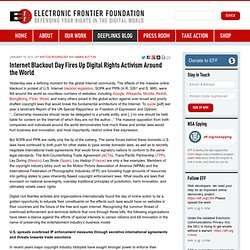
The effects of the massive online blackout in protest of U.S. Internet blacklist legislation, SOPA and PIPA (H.R. 3261 and S. 968), were felt around the world as countless numbers of websites, including Google, Wikipedia, Mozilla, Reddit, BoingBoing, Flickr, Wired, and many others joined in the global action against over-broad and poorly drafted copyright laws that would break the fundamental architecture of the Internet.
To quote [pdf] last year’s landmark Report of the UN Special Rapporteur on Freedom of Expression and Opinion: “...Censorship measures should never be delegated to a private entity, and [..] no one should be held liable for content on the Internet of which they are not the author...” Protests against SOPA and PIPA. A screenshot of the English Wikipedia landing page, symbolically its only page during the blackout on January 18, 2012.
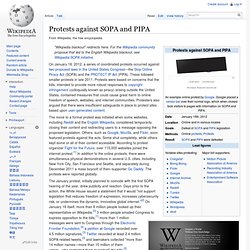
(A dynamic version of the page can be seen at en.wikipedia.org/? Banner=blackout, though the "Congress lookup" feature no longer works.) On January 18, 2012, a series of coordinated protests occurred against two proposed laws in the United States Congress—the Stop Online Piracy Act (SOPA) and the PROTECT IP Act (PIPA). These followed smaller protests in late 2011.
Protests were based on concerns that the bills, intended to provide more robust responses to copyright infringement (colloquially known as piracy) arising outside the United States, contained measures that could cause great harm to online freedom of speech, websites, and internet communities. After an Online Firestorm, Congress Shelves Antipiracy Bills. European Commission digital chief backs anti-SOPA protests. Web inventor Tim Berners-Lee slams SOPA and PIPA legislation. Wikipedia: SOPA protest led 8 million to look up reps in Congress. On Wednesday, some of the Internet's largest entities blacked out their websites -- or their logos or some of their content -- in a protest against the SOPA and PIPA anti-piracy bills making their way through Congress.
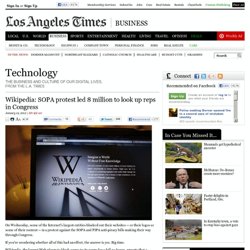
If you're wondering whether all of this had an effect, the answer is yes. Big time. Wikipedia, the largest Web player to block access to its pages for a full 24 hours, reports that a whopping 162 million people experienced the blackout on the online encyclopedia's landing page. In addition, 8 million U.S. readers took Wikipedia's suggestion and looked up their congressional reps from the site. Google reported Wednesday that as of 1:30 PM PST, 4.5 million people had signed its petition asking lawmakers to reject the Stop Online Piracy Act in the House and the Protect Intellectual Property Act in the Senate.
Twitter said 2.4 million SOPA-related tweets were sent in the first 16 hours of the day Wednesday. Thank You, Internet! And the Fight Continues. Today was a truly inspiring day in Internet history.
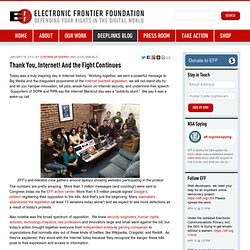
Working together, we sent a powerful message to Big Media and the misguided proponents of the Internet blacklist legislation: we will not stand idly by and let you hamper innovation, kill jobs, wreak havoc on Internet security, and undermine free speech. Supporters of SOPA and PIPA say the Internet Blackout day was a "publicity stunt. " We say it was a wake-up call. Public Outcry Over Antipiracy Bills Began as Grass-Roots Grumbling. U.S. PIPA and SOPA Acts and the Internet Blackout – SilenceBreakers. By Jane Watkinson The internet, what the founder of the World Wide Web (WWW) – Sir Tim Berners-Lee – said is a human right, is locked in a battle with the US Congress as Senate debate the Protect Intellectual Property Act and the House of Representatives consult over the Stop Online Piracy Act. The Acts represent an attack on internet freedom. The US is a country that prides itself on democracy and human rights, but has a history of hypocrisy as they themselves battle with their own democratic deficit.
If these Acts were to pass, this would have major implications for the internet as we know it, especially given the Acts are unclear in terms of their effect upon non-US sites. For instance, already “the domain of a Spanish site, rojadirecta.org, was seized in early 2011 by U.s authorities without adequate due process, notification to the site’s owners, or an option to defend themselves, despite having been declared legal by two Spanish courts”. Wikipedia joins blackout protest at US anti-piracy moves.
Obama Administration Responds to We the People Petitions on SOPA and Online Piracy. Sopa and Pipa anti-piracy bills controversy explained. 17 January 2012Last updated at 07:45 ET The US laws are designed to block pirate sites, but critics say it will also impact the wider net The Stop Online Piracy Act (Sopa) is the bill being considered by the House of Representatives.
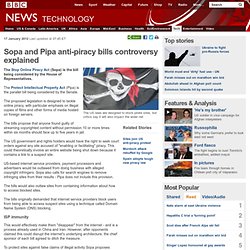
The Protect Intellectual Property Act (Pipa) is the parallel bill being considered by the Senate. The proposed legislation is designed to tackle online piracy, with particular emphasis on illegal copies of films and other forms of media hosted on foreign servers. The bills propose that anyone found guilty of streaming copyrighted content without permission 10 or more times within six months should face up to five years in jail. The US government and rights holders would have the right to seek court orders against any site accused of "enabling or facilitating" piracy. US-based internet service providers, payment processors and advertisers would be outlawed from doing business with alleged copyright infringers. ISP immunity.